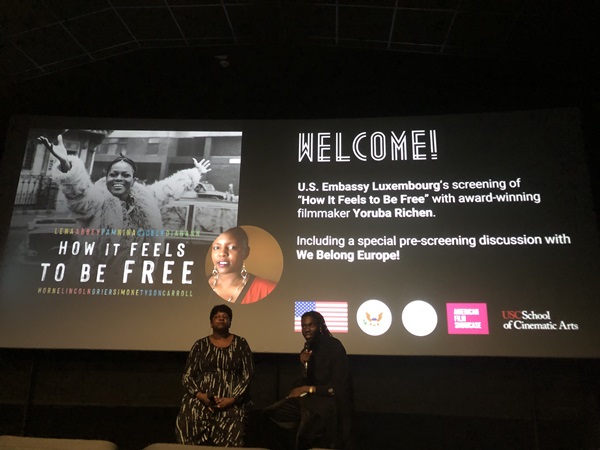 (L-R) Yoruba Richen, film director; Aymeric Kabore, We Belong Europe representative;
Credit: Otilia Dragan/Chronicle.lu
(L-R) Yoruba Richen, film director; Aymeric Kabore, We Belong Europe representative;
Credit: Otilia Dragan/Chronicle.lu
On the evening of Tuesday 21 November 2023, award-winning American film director Yoruba Richen attended the US Embassy in Luxembourg’s screening of her documentary film How It Feels to Be Free and took part in a Q&A.
The evening, held at Ciné Utopia in Luxembourg-Limpertsberg, started with refreshments, followed by a Q&A with the director and Aymeric Kabore, a diversity and inclusion professional and representative of the mentoring group We Belong Europe.
Yoruba Richen explained that the main topics of this film were race, representation and colonialism, with a focus on understanding these struggles and the fight for liberation.
Introducing her work, she noted that she started out in theatre and that her mother was a playwright who contributed to the Black Arts Movement. For Yoruba Richen, it became a focus point and her form of activism to tell stories that had not been told in the mainstream media. When cameras became smaller and more accessible (“pro-consumer cameras”), she made her first film about the Black community’s voices in San Francisco, “voices that were not heard”. She did not attend journalism school but ultimately earned a journalism fellowship and followed her passion for telling more invisible stories. Speaking about how she got to where she is today, she named the Public Broadcasting Service (PBS) as a major source of public support naming it “a platform where many of us […] are able to get our first film and be supported”.
How It Feels to Be Free was based on a book, following the stories of six famous Black women and how they helped reshape representation of African Americans on screen and in the entertainment industry. “This film is not a biography, which can get focused on the drama and ‘salaciousness’ of it as opposed to looking at the genius and also the way that we shaped culture.” Yoruba Richen also added that the opening up of more roles and opportunities for Black women did not happen “because Hollywood opened their arms,” but rather because of political activism and grassroots movements as well as the stars who paved the way for this.
How It Feels to Be Free is a documentary narrating the remarkable journey of six legendary African American women entertainers (Lena Horne, Abbey Lincoln, Nina Simone, Diahann Carroll, Cicely Tyson and Pam Grier) who confronted a deeply complicit entertainment industry that perpetuated racist stereotypes. Through their resilience and transformative impact, they not only reshaped their own narratives but also transformed their audiences and the image of African American people and what they could aspire to.
Aymeric Kabore noted that people often claim that the struggle of Black diaspora is less serious in Europe, obscuring the reality of racism and discrimination, which are systemic and so difficult to combat. Whilst noting that Black Americans in the past (such as Josephine Baker and James Baldwin) sought refuge in Europe, Yoruba Richen acknowledged that the realities of discrimination should be recognised.
It was also noted that, in the United States, there is more documentation on demographics and statistics, whilst in Europe, post-Holocaust and WWII trauma made it less likely or accepted to store certain information pertaining to race about people. This, in turn, made it more difficult to “quantify the problem”.
For Afro-descendants, often the first representation they had in media were Black American people, Aymeric Kabore said, to which Yoruba Richen added that very often African culture permeated the global culture whilst going unnoticed. She named the Netflix series High on the Hog: How African American Cuisine Transformed America and pointed out the importance of “uncovering and celebrating the connection” between the cultures.
The Q&A ended with Yoruba Richen encouraging the audience, if they felt drawn to it, to follow their passion despite their doubts and “despite all roadblocks”. “The funding will come if you have passion,” she stressed. “Don’t let that fear stop you”.
The documentary itself was a thoroughly well-researched and documented piece. Part-funny, part heartbreaking, it showed a long road of trials and attempts to better the industry to allow more Black stories and voices to be heard. It elegantly showed the strength and resilience, efforts and struggles of the Black community without ever forgetting to highlight the great minds and achievements on which the fight for liberation was built.








